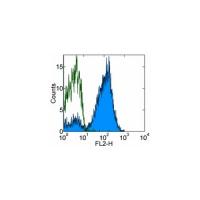CD7 Mouse Monoclonal Antibody [Clone ID: eBio124-1D1 (124-1D1)]
Other products for "CD7"
Specifications
| Product Data | |
| Clone Name | eBio124-1D1 (124-1D1) |
| Applications | FC |
| Recommended Dilution | Flow |
| Reactivities | Human |
| Host | Mouse |
| Clonality | Monoclonal |
| Formulation | Aqueous buffer, 0.09% sodium azide, may contain carrier protein/stabilizer |
| Concentration | lot specific |
| Purification | Affinity purified |
| Conjugation | Unconjugated |
| Storage | Store at -20°C as received. |
| Stability | Stable for 12 months from date of receipt. |
| Gene Name | CD7 molecule |
| Database Link | |
| Background | The eBio124-1D1 monoclonal antibody reacts with human CD7, also known as gp40 and Leu9. CD7, a 40 kD receptor, is a member of the immunoglobulin gene superfamily. The N-terminal amino acid sequence (aa1-107) is highly homologous to Ig kappa light chain sequence; while the carboxyl-terminal region of the extracellular domain is proline-rich and has been postulated to form a stalk from which the Ig domain projects. CD7 is expressed on the majority of immature and mature T lymphocytes, and T cell leukemias. It is also found on natural killer cells, a small suppopulation of normal B cells and on maligant B cells. Cross-linking surface CD7 positively modulates T cell and NK cell activity, as measured by calcium flux, expression of adhesion molecules, cytokine secretion and proliferation. CD7 associates directly with phosphoinositol 3'-kinase. CD7 ligation induces production of D-3 phosphoinositides and tyrosine phosphorylation.A clonogenic subpopulation of human CD34(+) CD38(-) cord blood cells that express CD45RA and HLA-DR and high levels of the CD7 has been reported. These cells possess the capacity for lymphopoiesis. They can generate B-cells, natural killer cells, and dendritic cells but do not possess the capacity to develop into myeloid cells or erythroid cells. The CD7(+) phenotype distinguishes primitive human lymphoid progenitors from pluripotent stem cells.Furthermore, it has been suggested that CD7 co-operates with CD28 during Treg function, as mice deficient in both CD28 and CD7 have reduced total numbers of Tregs and these Tregs have reduced suppressive activity. |
| Synonyms | GP40; LEU-9; Tp40; TP41 |
| Reference Data | |
| Protein Families | Druggable Genome, Transmembrane |
| Protein Pathways | Hematopoietic cell lineage |
Documents
| Product Manuals |
| FAQs |
{0} Product Review(s)
0 Product Review(s)
Submit review
Be the first one to submit a review
Product Citations
*Delivery time may vary from web posted schedule. Occasional delays may occur due to unforeseen
complexities in the preparation of your product. International customers may expect an additional 1-2 weeks
in shipping.






























































































































































































































































 Germany
Germany
 Japan
Japan
 United Kingdom
United Kingdom
 China
China



